This article originally appeared on VICE Netherlands.
Willem* was exhausted. It was late, and he was standing in his underwear in the middle of his DMT lab, which also happened to double as his kitchen. Willem had been working for 20 hours straight; he was so tired his eyes had started to burn.
For the fifth time in a row, he shook 32 jars one by one, each of them filled with crystallized DMT, water, and petroleum ether. A yard away, a single egg sizzled on the stove. As he mixed one of the glass jars with both hands, gas fumes escaped from the lid. Willem was on course to make 25 grams of DMT in a single session, with a street value of €2,250 [$2,566]. He was so close to being done for the night; instead, he was left staring at a blazing flame. His hands were on fire.
He quickly set the jar down and put the flame out with a dish towel. The sudden intense smell of petroleum made his eyes dart down to his singed beard, and down further to his now hairless hands and arms. For a while, all Willem could do was stare at the shriveled egg in the pan as he poured lukewarm water all over his arms. Shortly after that, he locked up his lab for the night and went to bed.
WATCH: Inside a Home DMT Lab Run by a Chemistry Teacher
"Luckily it didn't scar me for life, but it left an impression," Willem says now. "When you ignore your own boundaries, by working longer or making too much at once, you start making mistakes. And in this business, mistakes can cost you your life."
Willem often worked through the night in his kitchen, chemical fumes pouring out of the house, the smell only masked by incense burning on the window sills. But the fast cash made it all worth the effort. For five years, he contributed to a global drugs black market that was worth €18.9 billion [$21.4 billion] in 2017 alone, according to recent research by the Dutch police academy.
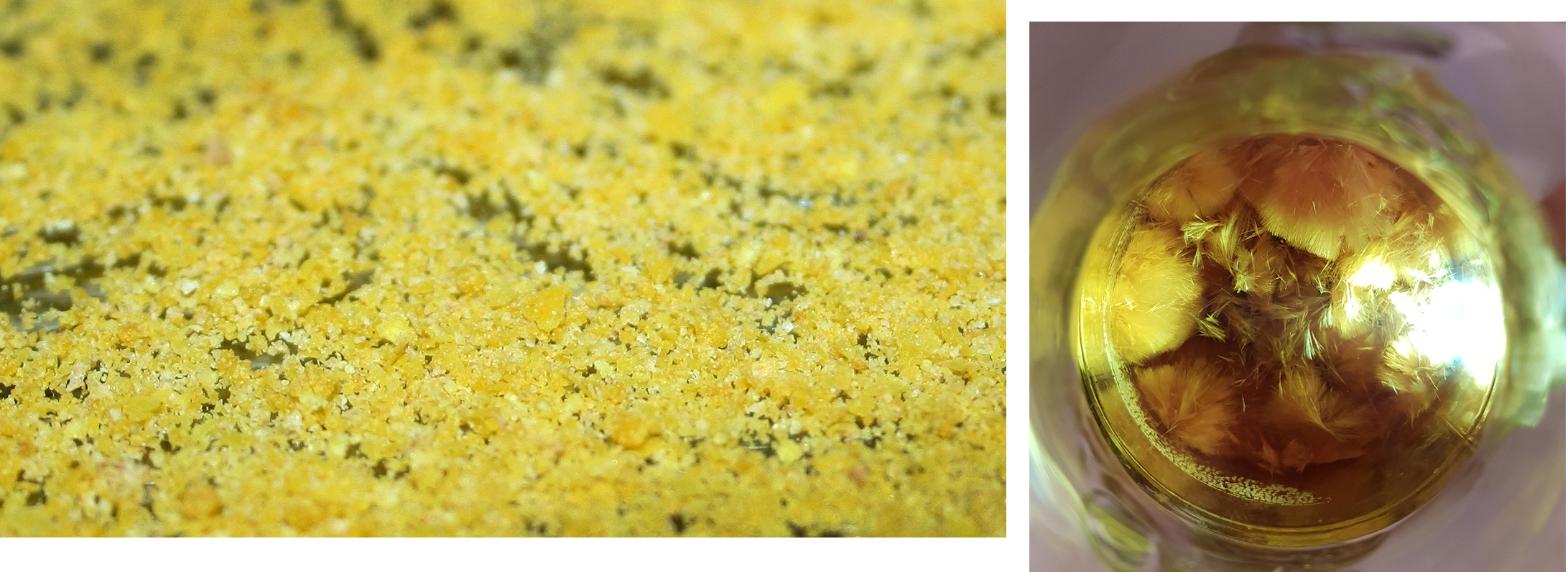
During the week, Willem lives in a trailer on a farm in Brabant—a province in the south of the Netherlands—where he's been working growing organic fruits and vegetables for a few months. On the weekends, when he's not working, he lives in an actual house, somewhere else in the same province. Willem shows me his fingers, covered in black sand. "[Farming is] very different from cooking up drugs, but I was prepared for that," he smiles.
We've agreed to meet close to his new job to talk about his previous life cooking DMT. The first thing I want to know is how this neat, well-spoken 26-year-old got into the large-scale production of synthetic drugs at the age of 22. "It all started with a basic fascination with the stuff," he explains.
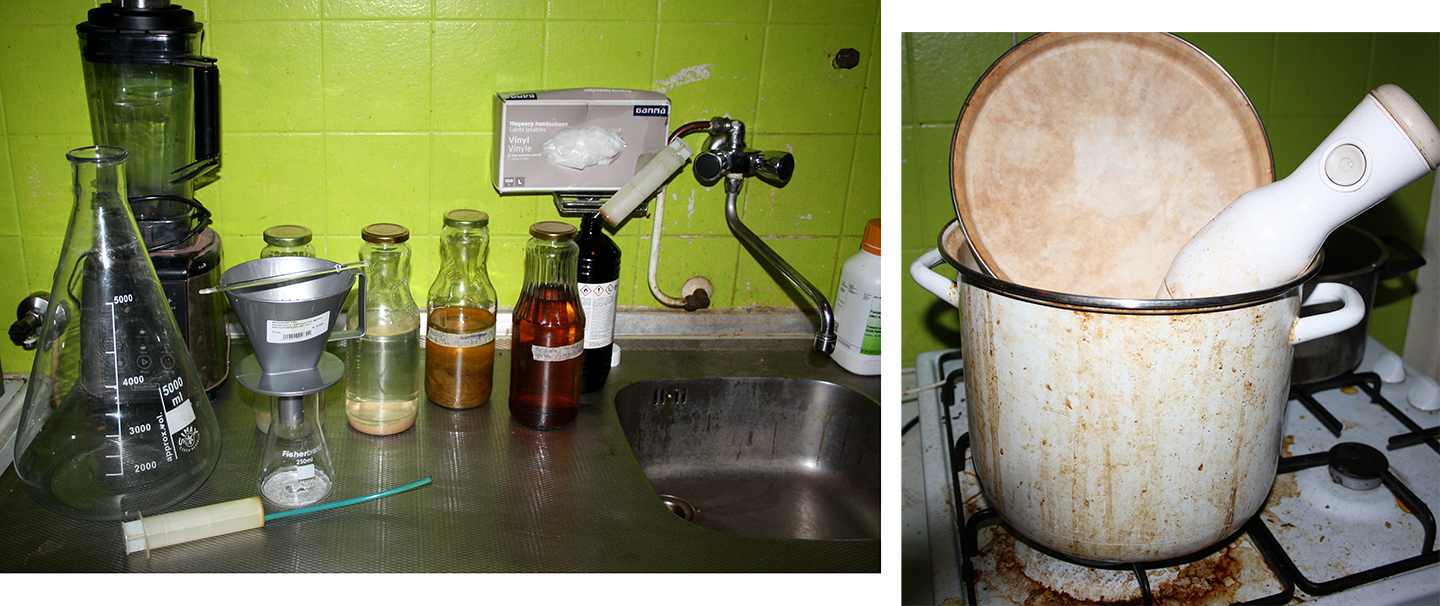
Willem was 21 when he smoked DMT for the first time. Ever since high school, he'd been curious about the psychedelic—but as it's quite rare, he initially found it hard to come by. Eventually, he got his hands on some. "The first time I did it, my blood was racing through my body," he remembers. "I took a deep breath, followed by three puffs, and before I could put the pipe down I was in a completely different world. It works immediately. The pipe and lighter were taken out of my hands, and with a delicate shove I was pushed onto my friend's sofa. I had lost all control."
Willem describes seeing every object in the room come away from the walls and fly around. Meanwhile, his friends were contorting into different shapes, before floating up and walking on the ceiling. "You have no time to process it—it's all happening too fast," he says. "During a trip like that, you don't feel any fear—all you experience is an indescribable sense of connection and love. But when I came back to reality, I shit my pants. It was traumatizing—yet at the same time, it was beautiful."
The experience left such an impression on him that Willem couldn't let it go. He started researching the origins of DMT online in order to understand his own experience better, and learned that even he—a chemistry drop-out—could make the drug at home by following a few easy steps. "An acid-base reaction isn't that complicated, and there are a ton of kitchen chemistry tips online," Willem explains.
For €150 ($170), Willem bought the starter kit to turn his kitchen into an experimental drug lab. "Making that first batch was messy," he remembers. "I ended up with two grams of DMT. That felt great, though I didn't know if it would actually work."
Willem knew it was only right to test the produce on himself before offering it up to his friends. "The first time was nerve racking," he says. "I was at a friend's place with my then-girlfriend. They knew I'd been working on it, but when I actually placed my homemade DMT on the table, there was a tense silence. I decided to go upstairs, and lit up a pipe while my girlfriend sat right next to me. I don't know why I had so much faith in things going well, but I did, and I was right to. It was magical!"
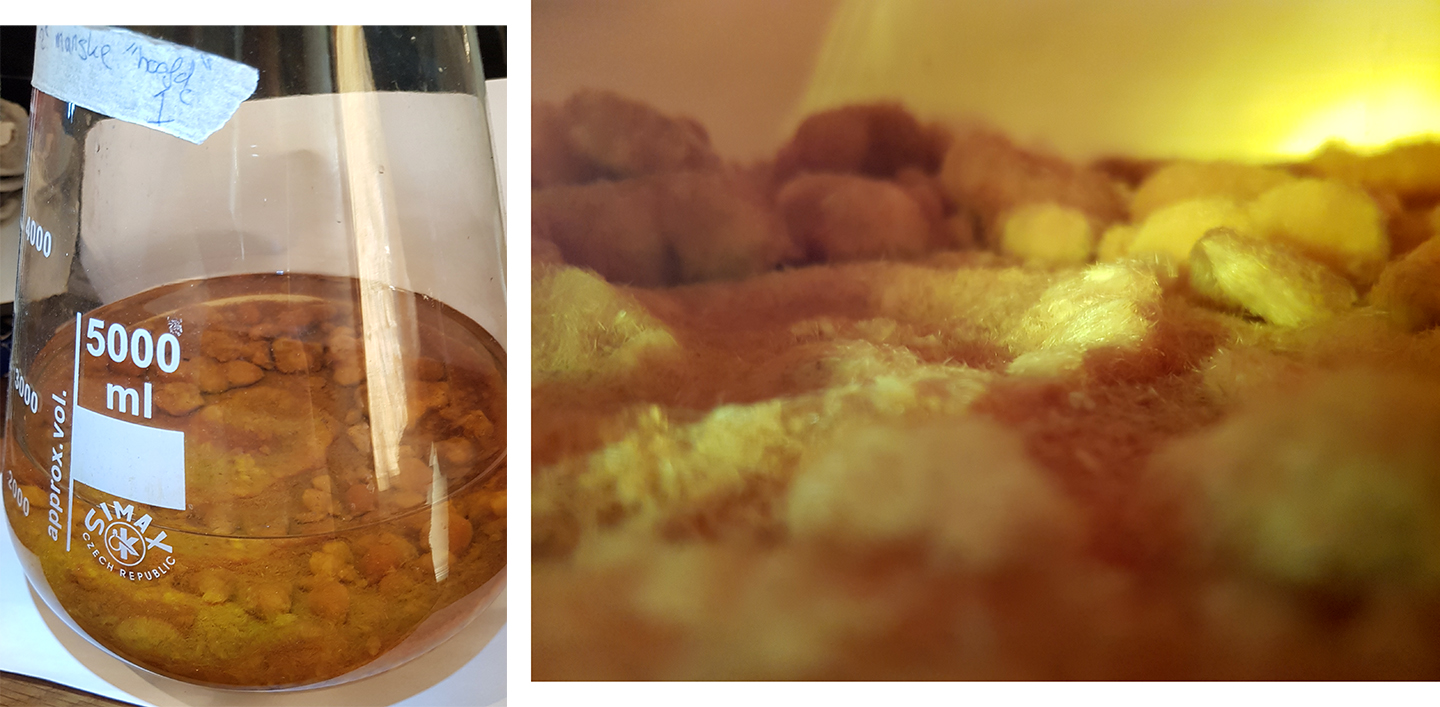
A year later, Willem finished school and became a clock repairer. He worked in a warehouse five days a week, eventually saving the €1,500 [$1,709] he needed to buy professional cooking equipment. He spent entire weekends at home alone, teaching himself how to cook DMT. "Aside from the drug itself, I developed an enormous amount of love and fascination for chemistry," he says. "I could look at DMT for hours while it crystallized in a glass jar. It turns chemistry into pornography," he beams.
The sun is starting to set as we make our way back to his trailer. "When something fascinates me, I dive a bit too deep into it," he says.
Soon, all his cupboards were filled with jars of sodium hydroxide, bottles of vinegar, and large conical flasks. There were plastic measuring syringes everywhere, and folders stuffed with recipes and research notes. While he's listing all the things he used to keep in his house, Willem laughs. "It was pretty reckless at the beginning to just have everything lying around in such a disorganized way. My friends who came over were a bit freaked out at first. But I was never secretive about it, and ultimately they also found it exciting."
Still, nobody wanted to buy off him. "The initial response was disappointing," he admits. "Some friends would buy a single dose from time to time, but that's about all I sold. At a certain point, I had produced 300 grams, which would sell on the streets for €27,000 [$30,728]. So I went looking for bigger buyers." Willem won't say how he found these big buyers, but does reveal they were great for business. "It was very different from the hippies and the psychonauts I sold to before. Suddenly, I was talking to actual businessmen—rich guys who always kept their word and followed through on contracts. The money just poured in."
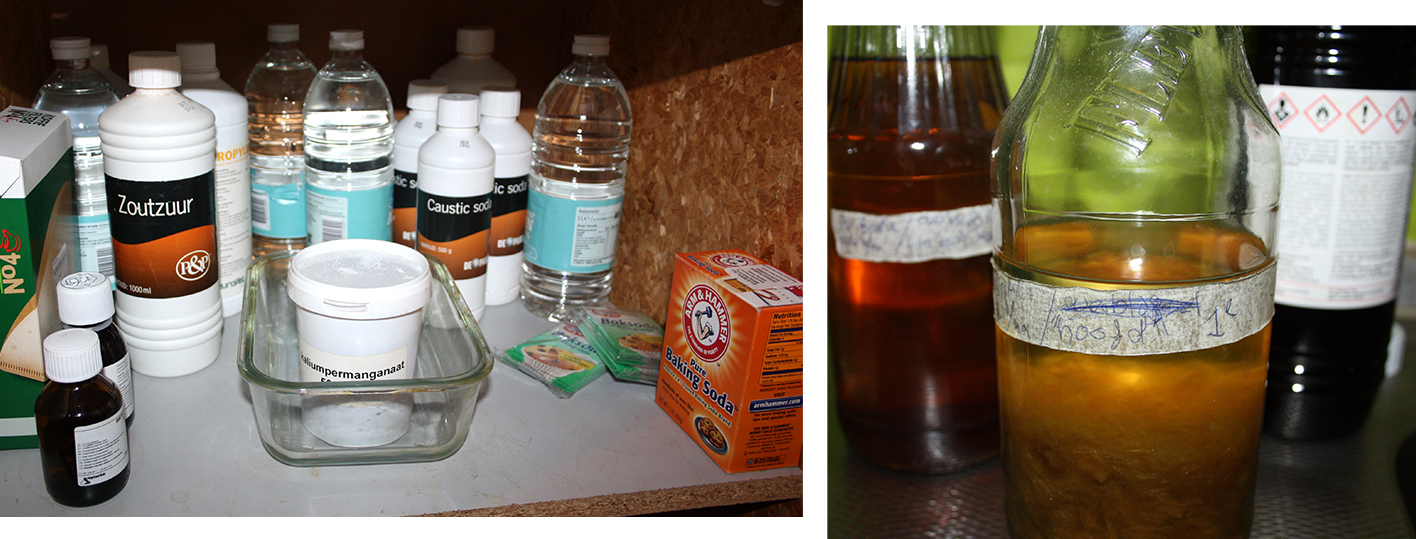
Willem became more and more efficient in his little kitchen—he graduated from working with just one small glass jar to 32 containers simultaneously. "That means you add liquid 160 times, and shake the jars 3,200 times," he calculates out loud. "At that point, it became a full-time job, not just a hobby, and I had to accept that I was breaking the law in a big way. It dawned on me more and more that I was a criminal—a feeling I kind of enjoyed. The more professional I became, the bigger the rush."
Once we arrive at his trailer, parked on the property of his new employer, we switch to the more practical side of the process. "I'd pick up most of the stuff at a DIY store," he tells me. "The first time they didn't ask questions. But when you show up for the tenth time to buy five bottles of sodium hydroxide, they want to know what you're using it for. You need that stuff to produce nearly every synthetic drug in the book, and it can even be used to make bombs. Sometimes they ask to take a copy of your ID. It meant that I had to go to a bunch of different stores."
Inside his trailer, he takes out a few notebooks. "For me, it was no longer about following a set method." By doing research, carrying out experiments, and keeping a ton of notes, Willem kept improving his recipes and process. He also started specializing in making a DMT-infused smoking blend called changa. "Even more rare than DMT!" brags Willem.
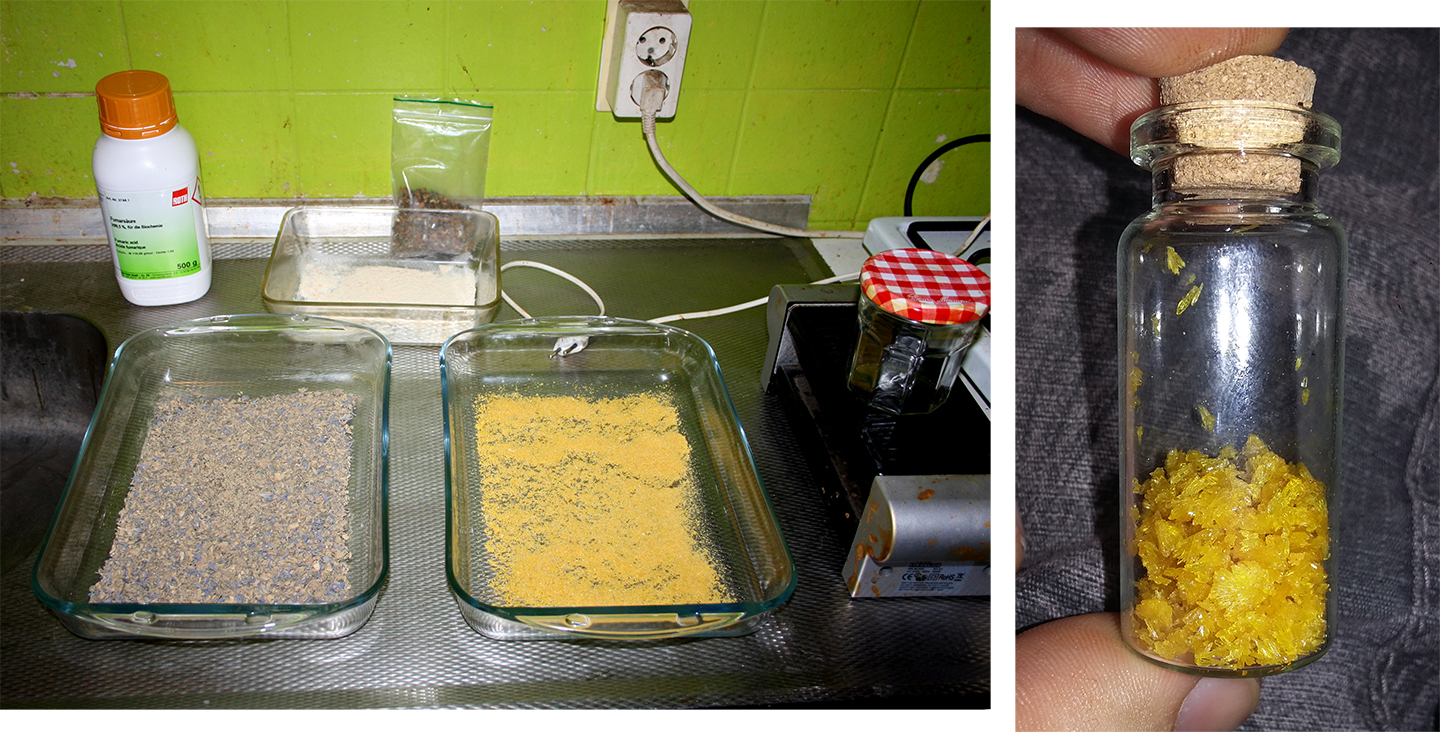
Willem is speaking a little softer now. "Chemical waste is a bit of a problem," he says. "I flushed my waste down the toilet only once, but I felt really bad about it. Other times, I've put it in jerrycans and left it on a street corner. But that's not right either—you turn it into someone else's problem. But when you're on the wrong side of the law, there's nothing you can really do."
At 24, Willem had landed enough big buyers to quit his regular job. At home, all he did was cook DMT. He had to work with his windows open, which caused the air around his home to constantly smell of petroleum ether. That in turn made him even more scared that the incense he burned would not be enough to mask the smell and keep his neighbors' suspicion at bay. Willem became increasingly nervous of every single person who passed by his house, and felt less and less comfortable at home. "When I was working [on DMT] full-time, I became very paranoid." he says. "The lack of sleep wasn't helping either. I worked for weeks on end, without seeing my friends."
Soon enough, the money didn't seem worth all that stress. "I used to think money would make me happy, but it's been a while since I felt that way," he says. "The guys who I was working for at the time wanted me to start producing speed or ecstasy. The plan was for me to move into a house in the middle of nowhere that was equipped with a full lab and all the materials and chemicals I needed. I could work undisturbed and make thousands of dollars a month."
He pauses for a moment and swallows. "For me, that was a step too far. I was done," he says. "For years, I spent all of my time cooking drugs and inhaling chemical fumes, with the risk of either getting caught or burning my house down. I wanted to stick with DMT and its world of hippies. When you produce speed or cocaine, you come into contact with very different people."
For the past year, Willem has been dissolving his drug empire. He still won't reveal how many people he used to work for, but says the process of dropping those relationships has been easy. So is he done for good? "Chemistry will always be a hobby of mine. But the days of hardcore cooking are over," he says. "I consider myself lucky because I never got caught and ended up with a nice amount of money saved—but in the end, I wanted my freedom back."
Eventually, Willem found that freedom, he tells me, in his new career as a horticulturist, after going back to school to study agriculture. He stretches his legs, folds his arms behind his head, and looks at the oil lamp on the small table outside his trailer. We say goodbye not long after. Willem has to be out in the fields again by 7 AM.
*Willem's name has been changed to protect his identity.
Sign up for our newsletter to get the best of VICE delivered to your inbox daily.
from VICE http://bit.ly/2CY0Y9l
via cheap web hosting
No comments:
Post a Comment